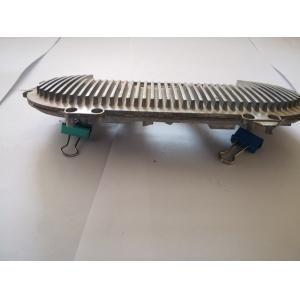

Add to Cart
| Specification | Customized,customer required,customer's drawings |
| Material | ADC12/ADC10/A380/A383/A390/413/AllSi9Cu3/AlSi10Mg,etc. |
| Application | Automobile, agricultural machinery, furniture, |
| construction, home appliances, electronics. | |
| Process | High pressure die casting or Semi-solid thixoforming |
| Machining | CNC machining center, CNC lathe |
| Casting tolerance | IT4 - IT6 |
| Machining tolerance | +/- 0.005mm,ISO2768-f |
| Standard | DIN,ASTM,GOST,ISO,BS |
| Heat treatment | Annealing treatment,solution treatment ,T1,T2,T3,T4,T5,T6 |
| Unit weight | 5g-30kg |
| Dimensions | <=1500mm |
| Die casting machine specification | 150T-3000T |
| Certificate | ISO9001, TS16949,ISO1400,RoHS |
| Finish | Plating,Painting,Powder Coating,Polishing, Stoving Varnish,Anodizing |
| Quality control | FEMA,PPAP,APQP,Control Plan,MSA, |
| Certificates for all requirements | |
| Test reports for every delivery | |
| Service | Weekly report,Key node report,Any questions will be answered within 24 hours. |
Benefits of die casting/aluminum die casting
Aluminum die casting is an efficient and economical process that
offers a wider range of shapes and components than any other
manufacturing technology. The parts have a long service life and
can be designed to complement the visual appeal of surrounding
parts. By specifying die castings, designers can obtain many
advantages and benefits.
High-speed production: Die casting of aluminum die castings can
provide complex shapes with more precise tolerances than many other
mass production processes. Little or no machining is required, and
thousands of identical castings can be produced before additional
tools are required.
Dimensional accuracy and stability: Aluminum die-casting parts
produced by die-casting are durable and dimensionally stable while
maintaining tight tolerances. They are also heat resistant.
Strength and weight: Aluminum die castings are stronger than
plastic injection molded parts of the same size. Thin-walled
castings are stronger and lighter than other casting methods. In
addition, since die castings are not composed of separate parts
welded or fastened together, the strength is the strength of the
alloy, not the strength of the joining process.
Multiple finishing technologies: Aluminum die castings can produce
products with smooth or rough surfaces, and they can be easily
electroplated or finished with minimal surface treatment.
Simplified assembly: Aluminum die-casting parts provide integral
fastening elements such as bosses and studs. The hole can be
punched and made into a size suitable for tapping and drilling, or
it can be cast with external threads.
